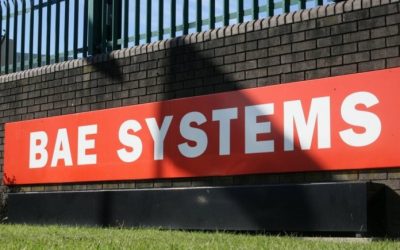Weapons Firms Install 50 Staff Inside the UK Ministry of Defence
BAE among arms firms paying Ministry of Defence staff’s salaries while winning lucrative contracts

All Global Research articles can be read in 51 languages by activating the “Translate Website” drop down menu on the top banner of our home page (Desktop version), or on the Translate This Article above.
To receive Global Research’s Daily Newsletter (selected articles), click here.
Follow us on Instagram and Twitter and subscribe to our Telegram Channel. Feel free to repost and share widely Global Research articles.
***
More than 50 paid employees of global arms companies are working inside the UK’s Ministry of Defence, openDemocracy can reveal, sparking questions about conflicts of interest and national security.
They include nine staffers on long-term secondment from the UK’s biggest weapons manufacturer, BAE Systems, some of whom have been embedded inside the department for years.
Last year, the company made more than £4.1bn in sales from the MoD, boasting about its “strong and long-standing relationships” with the UK government. Almost all of this money was spent through contracts that were awarded without competitive tender.
The government would not say whether the secondment scheme represented a conflict of interest.
Campaigners today called on the government to come clean about lobbyists and business officials working in Westminster. The finding comes after it emerged that Liz Truss’s top aide, Mark Fullbrook, is being paid via his own lobbying firm.
Dr Michael Ofori-Mensah, head of research at Transparency International Defence and Security, said:
“Seconding industry insiders for senior Whitehall roles can provide invaluable insight, but also carries major conflict of interest risks.
“Government should do more to mitigate the risks of captured policy and procurement by establishing a comprehensive register of lobbyists and strengthening oversight of the revolving door between the public and private sector.”
Records obtained by openDemocracy show that at least four BAE officials have been based for over three years in Defence Equipment and Support, the arms-length government body that purchases military goods and services from companies like BAE.
A further six MoD staff are on secondment from Qinetiq, a huge defence technology company, while Rolls-Royce and Babcock have supplied at least two staffers each.
But other officials installed in the ministry appear to have been lost in the system, with no record of who is paying them. Responding to a request under the Freedom of Information Act, the department admitted it could not identify the employers of at least 23 people currently there on secondment.
A spokesperson did not respond directly to openDemocracy’s questions about why this had happened and whether it could represent a national security risk.
Meanwhile, employees of seven arms companies including BAE, Leonardo and MBDA are currently on secondments at the Department for International Trade (DIT), documents obtained by openDemocracy show.
The DIT did not disclose what roles the staff had been seconded to work in, but confirmed they were largely concentrated in the UK Defence Security and Export directorate, which helps weapons companies sell arms abroad.
A government spokesperson told openDemocracy the secondments were part of “a long-standing arrangement designed to encourage better collaboration and improve technical expertise”. They added that all secondees work under normal civil service rules and are subject to “robust security checks”.
Dr Sam Perlo-Freeman, research coordinator at Campaign Against the Arms Trade, said the setup showed how “deeply embedded” the weapons industry is in government.
“The very department charged with regulating arms exports has representatives of the arms industry at its heart,” he said.
“The government essentially treats the industry’s interests as its own, with tragic consequences for victims of conflict and repression in Yemen and worldwide.”
BAE, Leonardo and MBDA have all exported weapons to Saudi Arabia that have subsequently been used in its war in Yemen. All three companies were named as parties to alleged Saudi war crimes in a complaint by human rights groups to the International Criminal Court.
The complaint states that aircraft, missiles and other arms supplied by the companies “contributed to the capacity” of the Saudi-led coalition, which is accused of bombing schools, hospitals and civilians.
BAE Systems alone has sold £15bn worth of weapons to Saudi Arabia – including Typhoon and Tornado fighter jets – since the conflict in Yemen began in 2015. Last year it brought in nearly £2.5bn in sales to the country, providing “operational capability support” for Saudi air and naval forces”.
A spokesperson for the company said that its work for Saudi Arabia “does not involve the company in military operational activity and our people are not involved in the loading of weapons for operational sorties”.
She added:
“A handful of our employees are seconded to roles in government to help increase understanding of our complex industry… Seconded employees are subject to strict confidentiality and proprietary rules to prevent any possible conflict of interest.”
*
Note to readers: Please click the share buttons above or below. Follow us on Instagram and Twitter and subscribe to our Telegram Channel. Feel free to repost and share widely Global Research articles.
Featured image is from cityam.com

